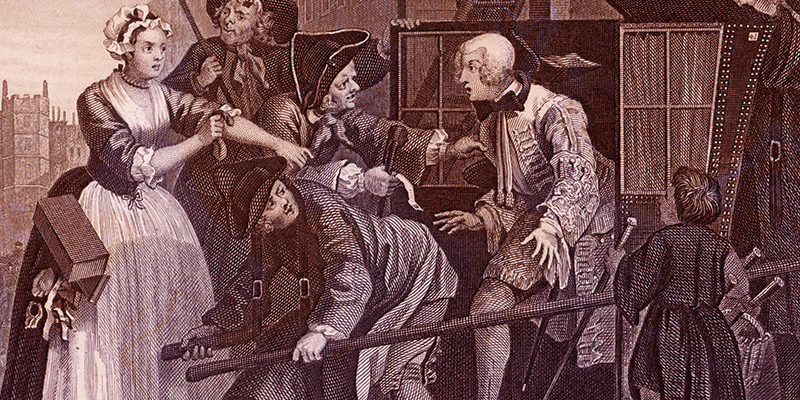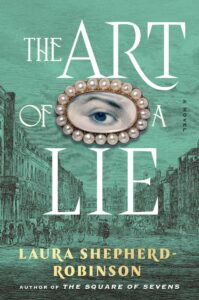The 18th century has long been my favorite historical period to read and write about. It possesses so many of the necessary ingredients for fascinating novels: aristocratic fortunes coexisting with grinding poverty and prostitution; manners and etiquette concealing sexual transgression and scandal; an intellectual flowering of ideas and artistic endeavor, but also murder, hangings, riots, blood sports and gin; the shame of slavery and colonial conquest, alongside political idealism culminating in two very different revolutions in France and America.
The best 18th century novels show us this world in all its complicated color, but also give us great stories with compelling characters and emotional heart.
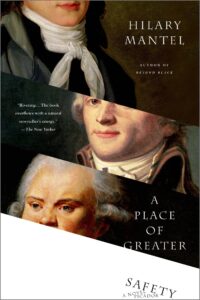
A Place of Greater Safety by Hilary Mantel
A depiction of Revolutionary France by one of the greatest writers of historical fiction, the novel follows the lives of three key revolutionary figures: Danton, Desmoulins and Robespierre. It glides from the grand political stage to the intimacies of the salon with effortless ease. A tale of faction and feminism, belief and betrayal, it explores how this idealistic enterprise descended into political violence, and ultimately devoured its children. I read it around the same time as I read Simon Schama’s ‘Citizens’ and they make wonderful companions. 900 pages long, but an incredibly fast-paced read, the book plunges you into the tinderbox that is revolutionary Paris. It took me three days to recover from the emotional intensity of it all.
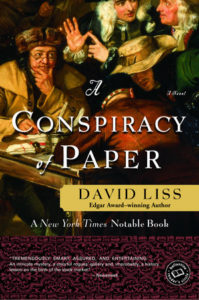
A Conspiracy of Paper by David Liss
Set in early 18th century London, this is a bawdy, picaresque romp, with a colorful array of rogues and wenches populating its pages. However, in between the intricate crime plot and the humor, the novel tackles some serious subjects: the anti-Semitism and legal oppressions faced by Jews in London at that time, as well as the world of the early money markets and joint stock companies. The story is narrated by Benjamin Weaver, a Jew and former boxer turned thieftaker. Weaver is told by a client that his estranged father, lately deceased, was in truth murdered. Unable to ignore this information, Weaver hunts for the killer, drawn back into the family he tried to escape, and the company of his beautiful cousin, Miriam. His inquiry brings him up against many enemies, notably the powerful Bank of England, their rival, the South Sea Company and the famous underworld villain, Jonathan Wild. Weaver is a brilliant protagonist, flawed, fun, but also complex and conflicted about his heritage.

The Devil in the Marshalsea by Antonia Hodgson
Set in London in 1727, this crime novel beautifully recreates the world of the Marshalsea debtors prison. The book’s hero, Thomas Hawkins, is a wonderfully flawed parson’s son—a womanizer, brawler and gambler, who makes for a very entertaining narrator. The bawdy language and humor that crackles off the pages is a delight. Called upon by the authorities to investigate the murder of another inmate, Hawkins’ inquiry makes him enemies high and low. Amidst the twists and turns of the plot, the book never loses sight of the horror and cruelty of 18th century life for the destitute.
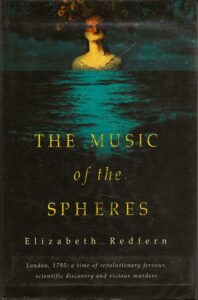
The Music of the Spheres by Elizabeth Redfern
Set in London, 1795, against the backdrop of the French Revolution and Britain’s war with France, this novel has everything: spies, murder, prostitution, politics, and the quest of a group of French refugee astronomers to find a new planet. Jonathan Absey is one of the darkest protagonists I’ve ever come across: a Home Office agent, determined to find his daughter’s killer—a murderer of red-headed prostitutes—he is prepared to see his entire life fall apart rather than give up the hunt. Convinced that the killer has a connection to a group of émigré star-gazers, he blackmails his own brother into infiltrating their circle. But the group may also harbor a Republican spy, and Absey is entangled in a thorny nest of political intrigue. Redfern’s writing is poetic, and her plotting ingenious. Historical crime at its finest.
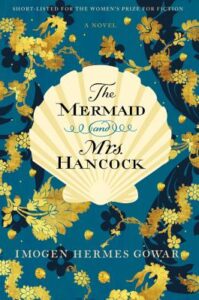
The Mermaid and Mrs Hancock by Imogen Hermes Gowar
Shortlisted for the Women’s Prize for Fiction, this debut novel is astonishingly well-written, immersing the reader so thoroughly in 18th century London that it was a wrench to be pulled back to the 21st century whenever I put the book down. The story follows a Deptford merchant, Mr Hancock, who makes a fortune exhibiting a ‘mermaid’ supposedly found in the Java Sea to London’s crowds. There he meets Angelica Neal, a notorious courtesan, who is by turns, greedy, tender, vain, and brilliantly funny. The good-hearted Mr Hancock doesn’t stand a chance. A book about commerce and showmanship, fakery and desire, the appearance of a real mermaid who inspires melancholy in men threatens to disrupt their fledgling union. The characters are vivid and beautifully drawn, the writing lyrical and clever.
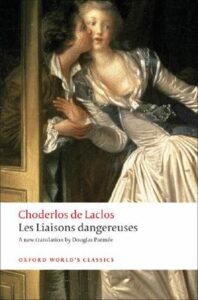
Les Liaisons Dangereuses by Choderlos de Laclos
Written in 1782, in pre-revolutionary France, this classic novel immerses the reader in the world of the French aristocracy in the years before the guillotine fell. That this book has inspired so many film and theatre adaptations (including 1999’s Cruel Intentions, which I love) is a testament to its compelling characters and timeless themes: desire, revenge, love, and deceit. Written in epistolary form, an exchange of letters between the Marquis de Merteuil and her friend, the Vicomte de Valmont, the plot centres upon the schemes and machinations of these two delightfully depraved characters. The Marquis enlists the help of Valmont to seduce the young bride of an ex-lover, whilst she assists him in seducing the famously chaste Presidente de Tourvel, a highly religious woman. The writing is a treat, knowing and witty, and the characters, especially the women, are creatures of fascinating complexity and nuanced motive.
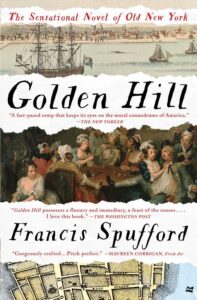
Golden Hill by Francis Spufford
Set in 1746, in colonial New York, this book begins with the arrival in Manhattan of an Englishman, Mr Smith, who presents a bill of exchange for £1,000, an enormous sum, to a local trader, Mr Lovell. Smith’s origins and motives for being in New York are obscure, and rumours whirl around him, as he muddles his way into Manhattan society. The setting is beautifully depicted, New York a city of Dutch gables and steeples, with Smith, an outsider, a wonderful guide to its people, politics, and economy. Much of New York is glittering and new, and Smith’s time is spent engaged in coffeehouse banter, parlour flirtations and amateur theatrics. But Spufford doesn’t neglect the city’s dark heart: the rampages of the mob, the horrors of slavery, and the New Yorkers’ fear and paranoia about the motives of their colonial masters across the water. Intelligent and funny, it is also, in places, very moving.
***

